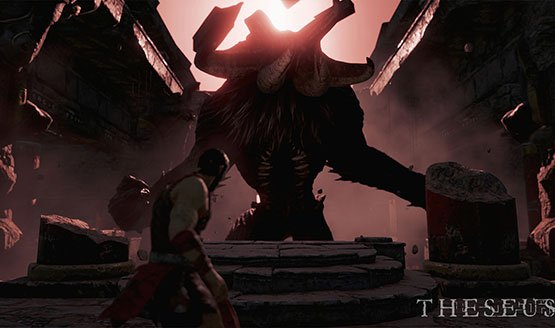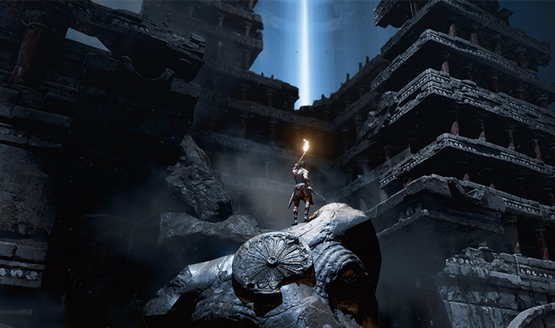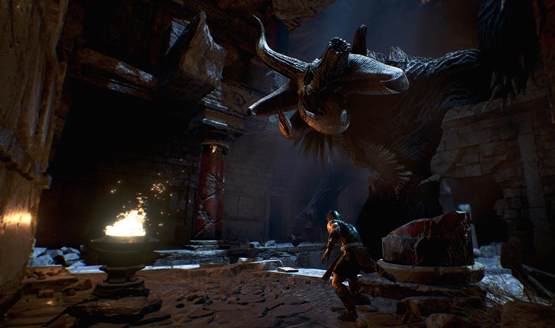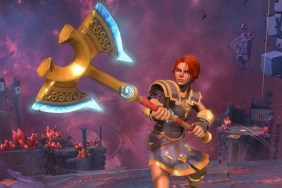Virtual reality has only been available at retail for about a year, so it’s understandable that we’re still seeing a lot of experimentation and innovation in this space. First-person games are the obvious choice, as are games with a god-like view of the world, but we’ve seen a ton of developers take a unique tack in their approach to VR, attempting to see how the immersion and presence can be utilized in ways that go outside the box.
Theseus is based on the Greek myth of the Minotaur in the labyrinth. It’s a loose interpretation, so you can expect some surprises in the narrative department, which is probably for the best anytime someone takes on known mythology. I’m keenly reminded of that one time when a man with an ashen body slaughtered every god that Mount Olympus could throw at him. Theseus hints at an almost Dark Souls inspired story, and the massive labyrinth teases a number of secrets hidden within its halls.
Instead of putting you inside of the labyrinth from the first-person perspective of the titular character, you’ll be set at fixed camera angles and over his shoulder at times, with the ability to look around using your own head. Think of third-person action games, notably Devil May Cry or God of War, imagine their camera angles being adapted for VR, and you’ve got a pretty good idea of what Theseus is like, at least in the camera department. The action is nowhere near as fast paced, and the very limited combat against a single enemy type (aside from the Minotaur) ends up being clunkier than an early PS2 game. As I slowly slashed and dodged the giant arachnids, I watched as Theseus’ character model would reset and stutter, instead of offering any sense of fluid combat that I know has been possible for more than 10 years.
It didn’t matter much though, as there are less than 10 combat encounters in the entire game. In fact, most of Theseus ends up feeling like an on-rails experience with little for the player to do except push the analog stick in the direction that Theseus needs to move. When there is environmental interaction, it ends up being telegraphed by glaring icons of the buttons, not just while learning the game but every time you get to an edge to drop down or tunnel to crawl through.
Crawling Through the Maze
I wanted desperately for Theseus to catch my interest but that moment never came. It starts off exceptionally slow-paced and stays that way with only a few exciting moments to punctuate the slow gameplay. After just over an hour, including a few deaths, a restart due to a bug, and a fair amount of attempting to explore, the game’s credits came to a close and I was back at the main menu.
Apparently there are some additional secrets to discover and a “true” ending for finding them all, but I couldn’t for the life of me say where they would be. Theseus never encourages any kind of exploration or discovery, instead railroading you along to the finish line on an exceptionally slow train. I can’t see how anyone could pull the advertised three to five hours from it unless there’s a whole secret side to the labyrinth that never shows its face, and judging by the trophies that are still sitting at 0% as of release, I’d imagine no one else has seen it either.
With all that Theseus does wrong, it’s a great proof of concept for how a game like God of War, Uncharted, or Devil May Cry could be translated to a virtual reality platform. Allowing players to look around the environment using their own head has a phenomenal fly on the wall kind of feeling, enveloping players within the myth of Theseus and the Minotaur in a way that no other platform has ever done. The pounding and roaring of the Minotaur that haunt the crumbling walls is terrifying, particularly with headphones. The over-the-shoulder parts feel a bit odd as Theseus will change direction depending on where you look, so I felt like the game was giving me the ability to look around at the ruins around me as I walked slowly forward, but encouraging me not to use this new found power.
There’s a lot of potential to really have Theseus be a great adventure, but it ends before you can get invested at all, a slow burn with an all too rapid conclusion. It feels like the whole middle part of the game is missing, with a long intro leading right into the climax. If it hadn’t played like a bad PS2 game. If it had been longer. If I had been less railroaded. If there had been a more meaningful buildup of the intriguing narrative. So many elements came together — or rather failed to coalesce — that make Theseus a less than memorable virtual reality experience, which is disappointing as I would love to have an engaging reason to play a unique virtual reality take on Greek mythology. Theseus just isn’t it.
Theseus PSVR review code provided by developer. Reviewed on standard PS4. For more information on scoring read our Review Policy.
-
Fly on the wall VR style is unique and interesting
-
Minotaur's constant presence is horrifying
-
Extremely short
-
Railroaded segments make the labyrinth feel linear
-
Plays like a clunky PS2 game











